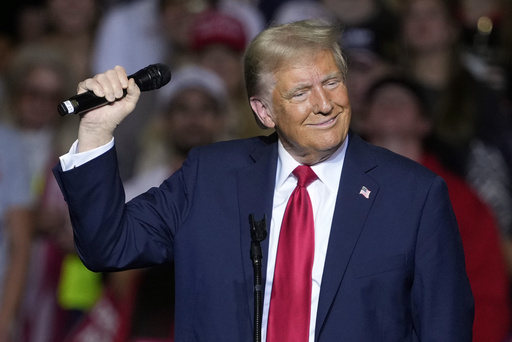
NEW YORK — As the countdown to the 2024 presidential election tightens, with only days remaining, Democrat Kamala Harris and Republican Donald Trump are engaged in a closely contested race.
In this final stretch, each day carries significant weight in influencing undecided voters. Though it’s typical for most individuals to have settled on their choice by now, recent developments may sway opinions in these final hours.
Both candidates are actively campaigning across crucial states, focusing on clear closing messages while trying to mobilize voters for the last early voting opportunities available. Alongside this effort, the spread of misinformation is escalating as the election nears.
This weekend marks a pivotal moment for both campaigns, leading up to Election Day on Tuesday.
Where Harris and Trump Are Campaigning
By examining the candidates’ schedules for the weekend, one can infer the key battlegrounds for the election.
While these plans may change unexpectedly, Trump has slated appearances in North Carolina, making a noteworthy stop in Virginia in between.
Democrats haven’t won North Carolina since Barack Obama’s victory in 2008, although the margin has been razor-thin in subsequent elections. Trump’s choice to spend time there indicates that Harris may have a genuine chance in the state, even as he seeks to project strength by visiting Virginia, a dependable Democratic stronghold since 2008.
On Sunday, Trump plans to head to Pennsylvania, a critical swing state. He will also revisit North Carolina and is scheduled for an event in Georgia, marking a return to a state that leans Republican but was narrowly won by Joe Biden in 2020.
Harris aims to campaign in North Carolina and Georgia on Saturday, highlighting her team’s optimism in those areas. On Sunday, she will shift focus to Michigan, a state seen as a safer Democratic territory.
Keeping Their Messages Clear
The strategy for Trump’s campaign is to keep voters engaged with a singular question: Are you better off now than you were four years ago?
In contrast, Harris’s campaign seeks to direct voters’ attention to trust, specifically whether they believe Trump or Harris will prioritize the nation’s interests.
The candidate who can most effectively maintain focus on these pivotal messages in the closing days could emerge victorious. However, both camps are facing initial hurdles.
Trump enters the weekend reeling from backlash over inappropriate jokes made during a recent rally, along with controversial comments about his political rival, Liz Cheney.
Meanwhile, Harris is working to steer discussions away from President Biden’s recent remarks labeling Trump supporters in an unflattering manner. Reports of altered transcripts concerning Biden’s statements have added to the turbulence.
As the spotlight of the election intensifies, neither campaign can afford to make missteps at this critical juncture, as both sides view this as a true tossup contest.
Impact of the Gender Gap
Trump’s comments have raised particular concerns within his coalition regarding female voters, especially given polling data revealing a noticeable gender gap.
Harris has fared significantly better with women, partly due to the Republican stance on abortion rights, which has had adverse implications for Trump’s support among this demographic.
As early voting trends emerge, reports indicate that more women appear to be voting early compared to men. Trump’s tone and comments may negatively influence this essential voter base.
Harris, aiming to address women’s rights fundamentally, criticizes Trump for not understanding the autonomy women deserve in personal decisions.
This weekend may prove crucial for both parties as they seek to sway any remaining undecided voters, particularly suburban women leaning Republican.
Early Voting Trends
With over 66 million ballots already submitted in this election cycle, surpassing one-third of the total turnout from 2020, early voting has noticeably shifted, particularly in Republican support compared to previous years.
Trump’s approach to encouraging early voting differs from past tactics, allowing more of his supporters to participate in advance rather than solely on Election Day.
As the campaigns strive to maximize early vote totals, several states will see intensified efforts, including Michigan, which maintains in-person voting through Monday, while Wisconsin offers early voting until Sunday. North Carolina has a cutoff for early in-person voting at 3 p.m. on Saturday.
Campaign operations also reveal challenges, with Trump’s get-out-the-vote efforts relying heavily on relatively inexperienced outside groups, while Harris has structured a traditional campaign apparatus with extensive paid staff and numerous offices across battleground regions.
The Rise of Misinformation
With the election closing in, Trump and his allies are amplifying unfounded allegations of voter fraud, mirroring past strategies.
His claims have become increasingly specific, casting doubts especially on mail-in ballots and voter registrations at various locations. However, investigations indicate the electoral system is functioning correctly.
Expect such baseless assertions to escalate, particularly across social media platforms, as the election nears. Historical data confirms that the 2020 election was one of the most secure in U.S. history, a narrative often drowned out by misinformation.
The dynamics of the closing campaign days will likely shape the outcome, with a vast array of factors influencing voter behavior during this final weekend.
